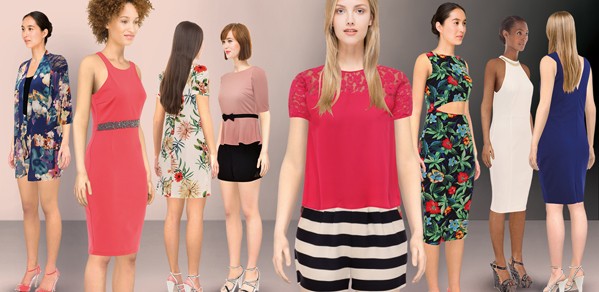
In spite of the spiraling increase in online clothing sales, the huge number of returned items poses an important challenge to the retail industry: how to reduce the volume of returned purchases without imposing punitive conditions which may deter customers from buying.
The inspiration behind this technology is about solving one of the biggest problems with online shopping – clothing shape and fit.
Tom Adeyoola
Academics from the Department of Engineering’s Computer Vision Group joined forces with Cambridge alumni at London-based technology company Metail to provide the perfect solution – give customers the tools to create 3D avatars of themselves and so engage in the ultimate ‘try before you buy’ experience.
Professor Roberto Cipolla, Professor of Information at the Department of Engineering, has for some years led research in the Computer Vision Group with the aim of reconstructing 3D models from 2D photographs. Accurate reconstruction of arbitrarily shaped or curved sufaces is loaded with difficulties and, initially, research was restricted to working with piecewise planar objects such as buildings. Because most buildings have clean lines and clear ‘vanishing points’ it is, relatively speaking, easier to calculate the camera viewpoint and to recreate them as a 3D image. This work resulted in the production of Photobuilder, a PC-based application that could generate 3D models of buildings in standard Virtual Reality Modelling Language (VRML).
Professor Cipolla’s group went on to pioneer novel techniques to recover the viewpoint and shape from the outline or silhouettes of an object viewed in the round. The Digital Pygmalion project, involving sculptor Antony Gormley, saw the team produce a high-resolution 3D computer model from just a handful of photographs, thus enabling the sculptor to scale-up his model from life-size to over 25 metres high.
One of Professor Cipolla’s research team was Duncan Robertson, who left the Department to co-found Metail with another Cambridge alumnus, Tom Adeyoola. Duncan had worked closely with Professor Cipolla on earlier research and, jointly, they had commercialised their findings in their own Cambridge spin-out company, Redimension. Their collaboration with technology firm, Metail, was a natural progression.
Metail’s focus was on the online fashion retailing industry. Tom had been inspired with the idea some years previously whilst on holiday in Vietnam. He had seen that Westerners were taking advantage of the relatively inexpensive custom-tailored clothing available there and hit upon the idea of a virtual changing room to allow customers to identify a better fit than the usual ‘off the rack’ garments available back at home. Back in the UK, he identified that a large number of orders being placed online were not being converted into actual sales because of the volume of unwanted, returned items. Metail’s vision was to provide the industry with the technology to allow customers to easily produce a 3D image of themselves, with their own exact measurements, height, colouring and even hairstyle. They contacted the Department of Engineering for help and the quest began.
Professor Cipolla, commissioned and supported by Metail, then refined his research into producing accurate human 3D images from customer photographs and a set of body measurements. He soon realised that some simple reference geometry would be necessary in order to produce precise results, as using just a photograph with no reference threw up too many variables. Customers were asked to provide a photograph of themselves standing within a doorway, so that the door frame provided a point of reference. Using an existing database of two thousand 3D models of real human bodies as a training database, and using research which had previously resulted in the production of Photobuilder, the team eventually devised a method for finding the most likely body shape for each customer.
Tests showed the results to be between 94-96% accurate; an astonishing accomplishment and one that had the potential to revolutionise the online retail sector.
And so the virtual fitting room was born.
Metail’s first client was retail giant Tesco, which launched the technology on its Facebook page in 2012, swiftly followed by women’s fashion retailer Warehouse and a number of other companies both in and outside the UK. Tesco’s Facebook trial was so successful that it quickly extended the service to its main site.
Tom Adeyoola said: “The inspiration behind this technology is about solving one of the biggest problems with online shopping – clothing shape and fit. Tesco were looking to create a more personalised shopping experience and with such an infinite choice now on the Internet, consumers are looking for a more tailored and relevant offer.” More recently, Metail has partnered with the television broadcaster ITV where the technology has been featured on the ITV morning lifestyle and chat show, This Morning.
Another of Metail’s clients, Shop Direct, publicly endorsed the technology at the Internet Retail Expo in Birmingham. An experiment was set up, primarily to look at whether the use of Metail’s technology had an effect on the rate of returns. Shop Direct reported that not only had return rates been reduced, but that sales conversion rates had also been increased by almost half a percent. Shop Direct’s Head of E-Commerce, Paul Hornby, said: “Half a percent doesn’t sound massive in comparison to some of the numbers you will hear, but we sell thousands and thousands and thousands of items every single day and if I can reduce returns on all of them by half a percent, I am happy with that, so this, for us, was a big big deal.”
Since February 2012, over 750,000 people have created their own 3D body models, called MeModels, using Metail. With 40 employees, US$20m investment and clients already in Germany, Asia and South America, Adeyoola is keen to conquer the US market next. If that happens, it will truly be a retail success story of amazing proportions with diminished returns.

